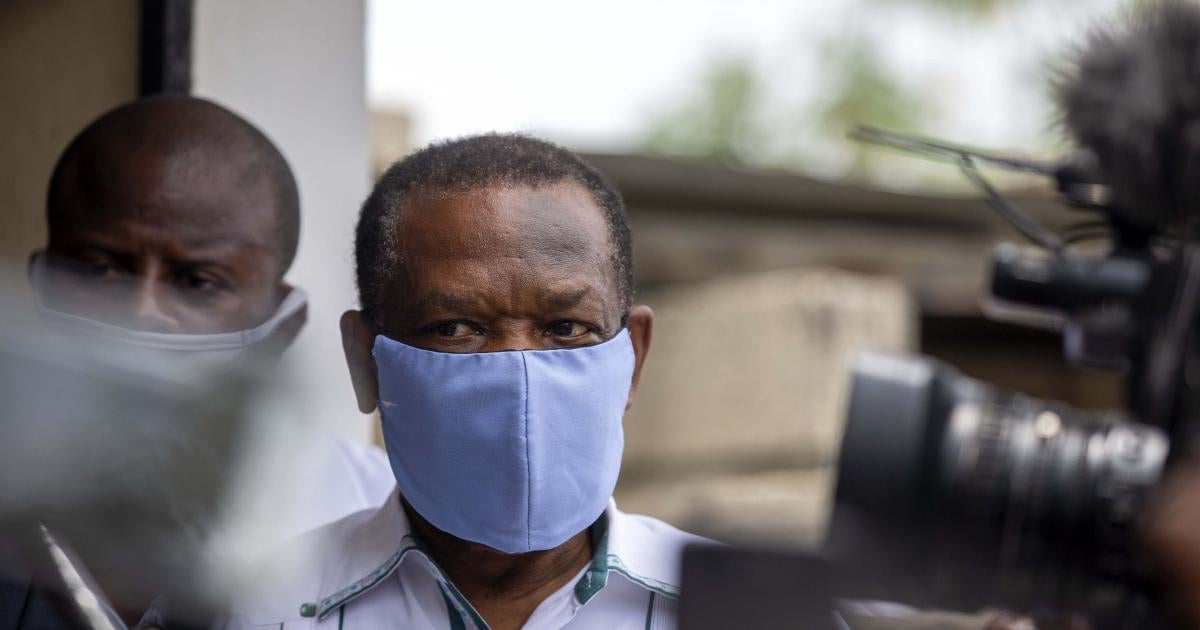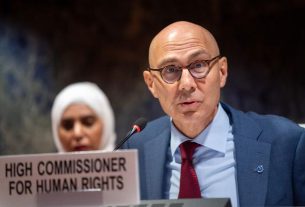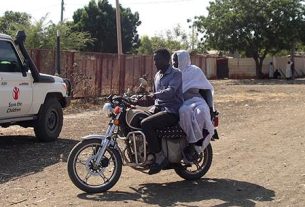(New York) – The Court of Arbitration for Sport (CAS) has wrongly annulled FIFA’s lifetime ban and other sanctions on Yves Jean-Bart, the former Haiti Football Federation (FHF) president, Human Rights Watch and the Army of Survivors said today.
The Fédération Internationale de Football Association (FIFA) first suspended Jean-Bart and a number of his vice presidents and staff in May 2020. It banned Jean-Bart for life in November 2020 following investigations, including by the athlete players’ union FIFPro, which documented at least 34 alleged victims, including children at the national football training center, by 10 possible abusers, including Jean-Bart. FIFA should appeal the CAS decision and urgently put new measures in place to protect witnesses in sexual abuse cases in Haiti and globally.
“In Haiti, FIFA and the sport of football gave Yves Jean-Bart enormous power, including to abuse child athletes, and cover up his abuses with threats to kill survivors and family members,” said Minky Worden, director of global initiatives at Human Rights Watch. “In its hearing, CAS failed to provide basic witness protection, despite knowing that many athletes and federation staff had received death threats.”
The Lausanne-based Court of Arbitration for Sport (CAS) is an international body to settle disputes related to sport through arbitration. It has proven to be an inadequate justice mechanism, for women athletes in particular. The arbitration mechanism’s terms of reference do not require it to take human rights into account, arbitrators have no trauma-informed approach or training, and the court makes decisions based upon sport federation rules that in many cases exclude human rights.
The decision exposes systemic failures by FIFA to create structures to allow safe reporting of abuse and to protect witnesses, whistleblowers, survivors, and family members who provide evidence. FIFA has the responsibility and duty of care to protect athletes and abuse survivors across its operations, based on its Human Rights Policy and “FIFA Guardians” program, which makes football leaders responsible for “responding to concerns about a child” and lays out “guidelines for identification, prevention, and mitigation of risk to children involved in football.”
Jean-Bart oversaw Haiti’s national football federation and “FIFA GOAL training center,” the Centre Technique National in Croix-des-Bouquets, also known as “The Ranch,” where promising child athletes as young as 12 trained. Over the last three years, dozens of whistleblowers, witnesses, and survivors have contacted FIFA, the Guardian, a UK-based newspaper, Human Rights Watch, FIFPro (the global football players’ union) and the Haitian authorities to investigate serious allegations of sexual assault against Jean-Bart.
Devastating testimonies about Jean-Bart coercing young female players into having sex with him, the confiscation of passports (a marker of human trafficking), and armed men thought to be affiliated with Jean-Bart threatening to kill anyone who testified about these abuses have emerged.
Human Rights Watch and FIFPro interviewed dozens of witnesses and survivors who gave evidence that the federation president sexually harassed and coerced young players into having sex with him. These national team players, female referees, staff, and whistleblowers described a workplace that was, as one witness said, “Full of sexual abuse and exploitation. Teen girls became pregnant and had children by the president. All of the players, officials, and staff at the center knew what was going on—and did nothing to protect us.” One athlete described the work environment at the Haiti federation as “hell on earth.”
In November 2020, FIFA’s Ethics Committee found Jean-Bart guilty of “having abused his position and sexually harassed and abused female players, including minors,” calling his abuses “inexcusable, a disgrace.”
Haitian law enforcement investigated the sexual abuse complaints in 2020, but Haiti is facing a deep political, humanitarian, and security crisis and the justice system faces enormous difficulties operating, which makes it all the more important for bodies like CAS and FIFA to ensure that Jean-Bart does not come back to a position from which he can continue doing great harm, with very little chance of oversight or accountability.
“Since players first started reporting sexual abuse in Haiti’s national football federation, every step of the way has been unsafe for survivors,” said Julie Ann Rivers-Cochran, Executive Director for The Army of Survivors. “Not only does reinstating Yves Jean-Bart put him back into a position of power, but it also creates a terrifying situation for the current survivors and all Haitian soccer athletes. FIFA and CAS have a duty of care for athlete survivors and whistleblowers, and they must make it safe to report abuse, and use a trauma-informed approach in Haiti and the many other national federations where sexual abuse is taking place. They cannot say they have created a safe place for athletes when reinstating Jean-Bart only further silences and minimizes the stories of those who reported.”
One documented threat to a witness came on April 4 and 5, 2022, immediately following the CAS hearing, when Haitian Creole text messages were received by the witness:
Don’t forget that you have family in Haiti…. You got into something that will be dangerous for you and your family. You are in a big deal. You have been to FIFA…. I’ll be honest with you, we’ve already prepared your coffins because personally I am going to crack your skull open. You think the story was going to end like this. He’s not going to lose his job and do nothing. I know where to find you, mark my word.
The texts also said, “I saw that you and [name of another witness redacted] got in front of Dadou,” seemingly to show the person threatening was present at the CAS hearing. Jean-Bart is known by his nickname “Dadou.”
From the first complaint, through Jean-Bart’s suspension and appeal before CAS, Human Rights Watch, the Guardian, Deutsche Welle, and others documented repeated threats to identify and kill survivors, witnesses, and family members:
- Survivors of sexual abuse first complained to FIFA in early 2020, and FIFA President Gianni Infantino’s top aide, Véron Mosengo-Omba, contacted the Haiti Federation to inappropriately share the complaint details with Jean-Bart’s team. After this tip-off, FHF staff were seen destroying papers at the federation, and players thought to be behind the complaint were threatened.
- In May 2020, a leading Haitian human rights group, the National Network for the Defense of Human Rights (Réseau National de Défense des Droits Humains, RNDDH), published a report documenting sexual abuse at Haiti’s football federation, and passport confiscation of players and threats to witnesses. The group said that the passports later ended up in Jean-Bart’s hands. Journalists and sources told RNDDH that ‘numerous’ survivors were unable to testify because of threats.
- In May 2020, the Guardian reported that victims of abuse said they were warned not to speak about abuse in the federation, quoting one: “A gangster called us. If we talk, they know where our uncles, aunts, cousins are.”
The global professional football players’ union FIFPro said, “Haitian players’ and whistle-blowers’ journey has been incredibly precarious and challenging. This latest development raises further questions about football’s ability to offer effective remedy for serious human rights violations.”
The CAS media release claims information from FIFPro and Human Rights Watch was not “sufficiently evidentiary.” Human Rights Watch was not asked to provide evidence to CAS, but has consistently called out FIFA’s failures to protect children and other survivors, and witnesses in the Haiti Football federation from mental and physical harm over the last three years.
Human Rights Watch and The Army of Survivors said the entire FIFA reporting system and CAS appeal process did not meet the sports bodies’ own required diversity and trauma-informed principles, causing further trauma and putting survivors at risk. A survivor-centered approach means adopting a harm reduction policy, which includes ensuring that emotional, physical, and digital protection measures are in place. No such systems were in place for survivors, witnesses, and their family members.
There was no voice distortion at the CAS hearing, and survivors and potential witnesses were asked to testify without meaningful protection for their identities. Understandably, many did not agree. At least one witness in the Haiti cases had to insist FIFA destroy testimony because FIFA refused to redact identifying information. All members of the CAS three-judge panel were men. Lack of diversity in governance is one of the main drivers of impunity, especially in cases that involve sexual abuse of girls.
“How can survivors of sexual abuse be expected to report abuse to FIFA if this travesty of justice is the outcome,” Worden said. “With the Women’s World Cup taking place this year, a harsh spotlight is shining on FIFA’s poor governance and inability to remove sexual abusers from sport.”



